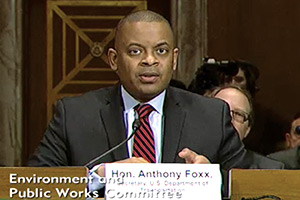Obama’s Budget Will Boost Grant Funds to Promote Freight Movement, Foxx Says

This story appears in the Feb. 2 print edition of Transport Topics.
WASHINGTON — President Obama’s upcoming budget request for the Department of Transportation will include parts of the four-year, $302 billion transportation plan the administration unveiled last year, Transportation Secretary Anthony Foxx told lawmakers.
At a Senate Environment and Public Works Committee hearing on Jan. 28, the secretary indicated the Grow America Act’s proposals expected in the fiscal 2016 budget request include establishing a grant program for freight transportation, primarily trucking and rail.
The grant program would be designed to help accommodate projected increases in freight tonnage during the coming decades.
The budget request was expected to be released Feb. 2.
Foxx said the request would boost funds to upgrade the country’s aging infrastructure through a “fix it first” system, with priority given to rural towns and tribal regions.
Also, the request would reauthorize “Buy America” requirements to stimulate job creation in public transportation, expand a loan program to facilitate development of public-private partnerships in states and municipalities, and increase the size of infrastructure grants in the Transportation Investment Generating Economic Recovery (TIGER) program.
The request also would seek funding to relieve congestion, and it calls for streamlining the permitting process for big-ticket construction projects.
Foxx said the proposal “advances my key priorities: protecting the safety of the traveling public, closing the nation’s infrastructure deficit and modernizing the U.S. transportation system through technology and process innovation.”
Last year, GOP leaders in Congress did not act on the Grow America Act, opting to advance a funding fix for the Highway Trust Fund account that expires at the end of May.
The budget request for federal agencies is not expected to gain much traction on Capitol Hill this time, either, but it will set the tone for this year’s battles on transportation funding.
Shortly after the request is unveiled, Foxx said the administration will present an update for the Grow America Act, which still would rely on reforms to corporate tax structures to generate about $150 billion in revenue for transportation programs.
“We put a pretty substantial bill out last year. We’re doing some fine-tuning, and we’ll get it out as soon as we can. We know there’s activity going on in the committee right now to try to figure out what to do, going forward. We want to be relevant in that conversation,” Foxx later told Transport Topics.
The secretary also pressed senators to craft a long-term highway bill before May, or states would have to delay construction projects relevant to the trucking sector.
“This is a crisis that is actually worse than most people realize,” Foxx said. “I predict that, over the course of the next few months, we’re going to see more state departments of transportation start to slow or stop projects.”
Vermont Gov. Peter Shumlin (D), speaking after Foxx, said many states require federal dollars to pay for transportation projects.
“What happens to a governor like me is that when there’s uncertainty about funding, or when the [federal] trust fund is out of money and you’re literally unable to send the match back to the states, we’re in a terrible position of having to dig for cash that we didn’t anticipate we would need, or turning to contractors and simply saying we can’t do the work that we contracted you to do because we’re not sure we can pay the bill,” Shumlin said. “This is the reality for governors across America.”
In Tennessee and Arkansas, transportation officials have already announced they would delay highway projects due to funding uncertainty.
Congressional leaders have yet to propose a multiyear transportation plan that reforms policy and authorizes long-term funding for highway programs.
But EPW Chairman James Inhofe (R-Okla.) and the panel’s ranking Democrat, Barbara Boxer of California, expressed a commitment to advancing a long-term bill this year. “We have to get the end-product done in time,” Inhofe told TT after the hearing. “We’re working very closely, probably closer than we normally would, with the other body. I feel optimistic about it.”
Boxer, who led the passage of a highway-reauthorization measure last year when she was EPW chairwoman, added that a lower-than-expected deficit in the trust fund should motivate her colleagues to approve a long-term bill: “We were anticipating $18 billion a year over six years. It’s $13 billion a year over six years.”
The California Democrat also announced she teamed up with Kentucky Republican Sen. Rand Paul on legislation that uses revenue from repatriation to pay for highway construction.
Repatriation allows companies to bring home profits from overseas businesses, relieving them of certain tax obligations.

